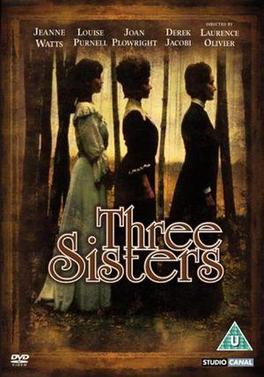Top Qs
Timeline
Chat
Perspective
Three Sisters (1970 film)
1970 British film From Wikipedia, the free encyclopedia
Remove ads
Three Sisters is a 1970 British drama film starring Alan Bates, Laurence Olivier and Joan Plowright, based on the 1901 play by Anton Chekhov. Olivier also directed, with co-director John Sichel; it was the final feature film directed by Olivier. The film was based on a 1967 theatre production that Olivier had directed at the Royal National Theatre. Both the theatrical production and the film used the translation from the original Russian by Moura Budberg.[1] The film was released in the U.S. in 1974 as part of the American Film Theatre. This was a series of thirteen film adaptations of stage plays shown to subscribers at about 500 movie theaters across the country.
Remove ads
Remove ads
Plot
This article needs a plot summary. (January 2024) |
Cast
- Jeanne Watts as Olga Prozorova
- Joan Plowright as Masha Kulighina
- Louise Purnell as Irina Prozorova
- Derek Jacobi as Andrei Prozorova
- Sheila Reid as Natasha Ivanova
- Kenneth MacKintosh as Fyodor Kulighin
- Daphne Heard as Anfisa
- Judy Wilson as Serving Maid
- Mary Griffiths as Housemaid
- Ronald Pickup as Baron Nikolaj Tusenbach
- Laurence Olivier as Dr. Ivan Chebutikin
- Frank Wylie as Maj. Vassili Vassilich Solyony
- Alan Bates as Col. Aleksandr Vershinin
- Richard Kay as Lt. Aleksej Fedotik
Remove ads
Production
Sidney Gilliat, who was on the board of British Lion at the time the film was made, said an American investor was meant to put in £100,000-£200,000 but pulled out and British Lion had to make up the shortfall.[2]
Reception
The film was apparently not widely reviewed in either its 1970 British or its 1974 US releases. Following the US release, the prominent critic Judith Crist wrote, "Once again we are faced with a neither-film-nor-play production, but it is, in Moura Budberg's liberal but satisfying translation and under Olivier's semi-cinematic direction, one at very least to fascinate devotees of the play. ... Through several performances, in Geoffrey Unsworth's luscious cinematography (and I mean the adjective in praise of the uncluttered and naturally generated flow his work deserves), and in the pacing there is somehow a sensuality and a sexuality underlying the work that I had not hitherto felt."[3] Molly Haskell wrote that the film "boasts in Joan Plowright's Masha the finest performance I have seen or ever hope to see of one of Chekhov's greatest women characters."[4]
The film lost money.[5]
Remove ads
Home media
The film was released as a region 1 DVD in 2004.[6] A Blu-ray version was released in the US in 2017.[7]
See also
- Three Sisters (1994 film), a 1994 Russian language film
References
External links
Wikiwand - on
Seamless Wikipedia browsing. On steroids.
Remove ads

